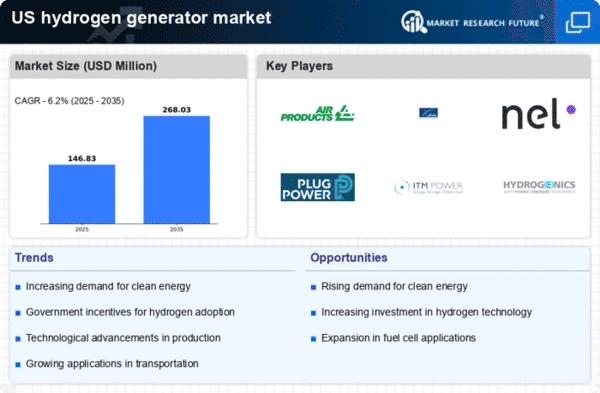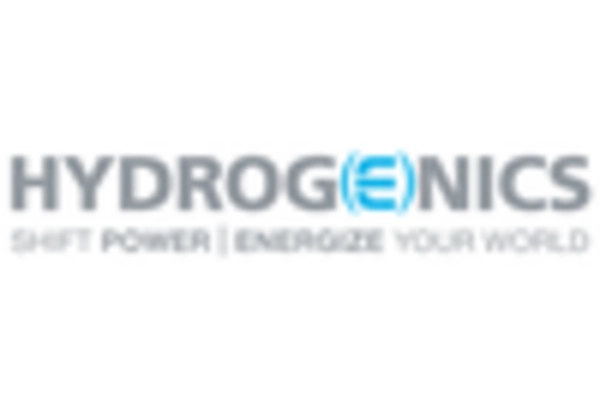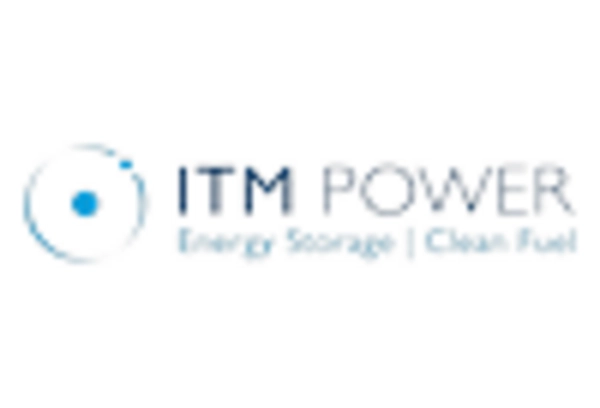Rising Energy Costs
The hydrogen generator market is experiencing a notable surge due to the rising costs of traditional energy sources. As fossil fuel prices fluctuate, businesses and consumers are increasingly seeking alternative energy solutions. Hydrogen generators offer a viable option, providing a cost-effective means of energy production. In the US, the average price of natural gas has seen significant increases, prompting industries to explore hydrogen as a more stable and potentially cheaper energy source. This shift is likely to drive investments in hydrogen technology, as companies aim to mitigate energy expenses. Furthermore, the hydrogen generator market is poised to benefit from this trend, as more entities recognize the long-term financial advantages of adopting hydrogen solutions over conventional energy sources.
Environmental Regulations
The hydrogen generator market is significantly influenced by stringent environmental regulations aimed at reducing carbon emissions. In the US, regulatory bodies are implementing policies that encourage the transition to cleaner energy sources. The Environmental Protection Agency (EPA) has set ambitious targets for reducing greenhouse gas emissions, which has led to increased interest in hydrogen as a clean fuel alternative. As industries strive to comply with these regulations, the demand for hydrogen generators is expected to rise. The hydrogen generator market stands to gain from this regulatory landscape, as companies seek to invest in technologies that align with environmental standards and contribute to sustainability goals.
Technological Innovations
Technological innovations are playing a crucial role in shaping the hydrogen generator market. Advances in electrolysis and fuel cell technologies are enhancing the efficiency and affordability of hydrogen production. In the US, research institutions and private companies are investing heavily in R&D to develop cutting-edge hydrogen generation technologies. For instance, improvements in membrane technology have the potential to increase hydrogen production rates while reducing operational costs. This trend indicates a promising future for the hydrogen generator market, as enhanced technologies may lead to wider adoption across various sectors, including transportation and industrial applications.
Growing Industrial Applications
The hydrogen generator market is witnessing growth driven by expanding industrial applications. Industries such as chemicals, refining, and metallurgy are increasingly adopting hydrogen as a critical feedstock and energy source. In the US, the chemical sector alone is projected to account for a significant share of hydrogen consumption, with estimates suggesting that hydrogen demand could reach 10 million metric tons by 2030. This trend indicates a robust future for the hydrogen generator market, as companies seek to leverage hydrogen for various applications, including ammonia production and fuel cell technologies. The versatility of hydrogen in industrial processes is likely to further stimulate market growth.
Increased Investment in Renewable Energy
The hydrogen generator market is benefiting from a surge in investments directed towards renewable energy projects. In the US, government initiatives and private sector funding are increasingly focused on developing sustainable energy solutions. The Biden administration has proposed substantial financial support for clean energy technologies, including hydrogen production. This influx of capital is likely to accelerate the growth of the hydrogen generator market, as new projects emerge and existing facilities expand. The emphasis on renewable energy not only aligns with national energy goals but also positions hydrogen as a key player in the transition towards a more sustainable energy landscape.
















